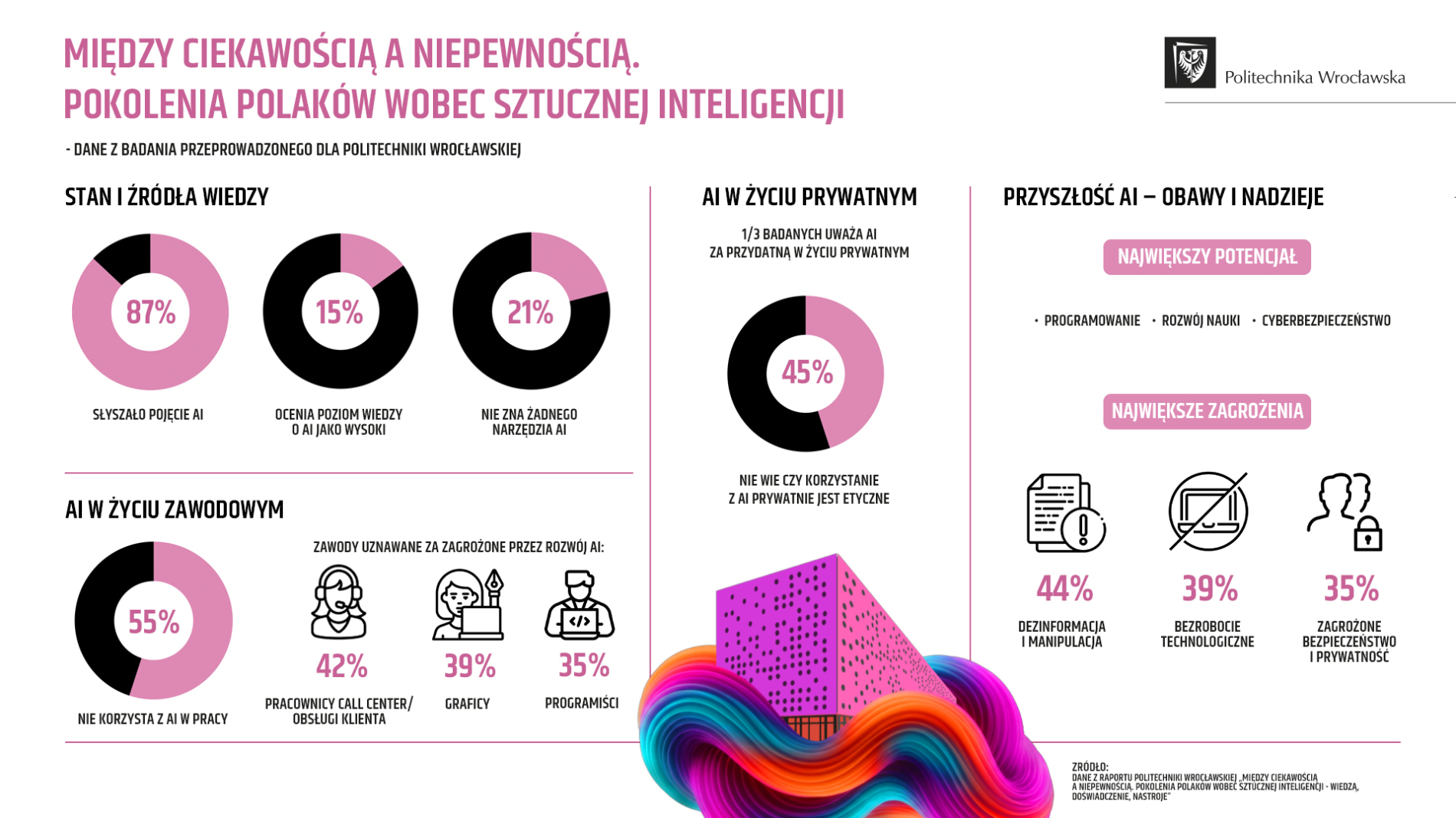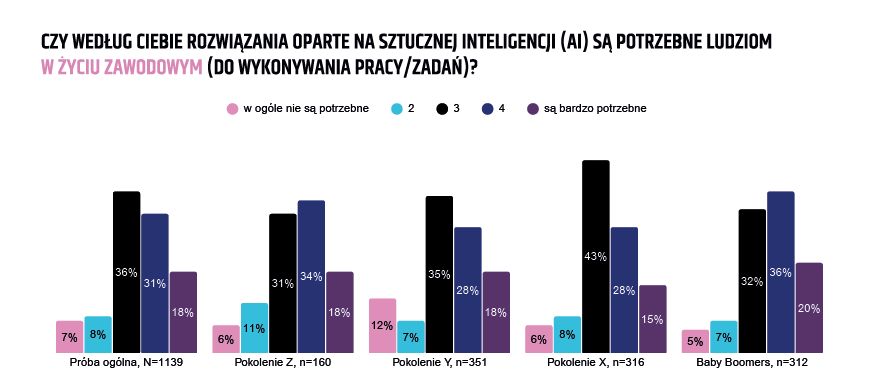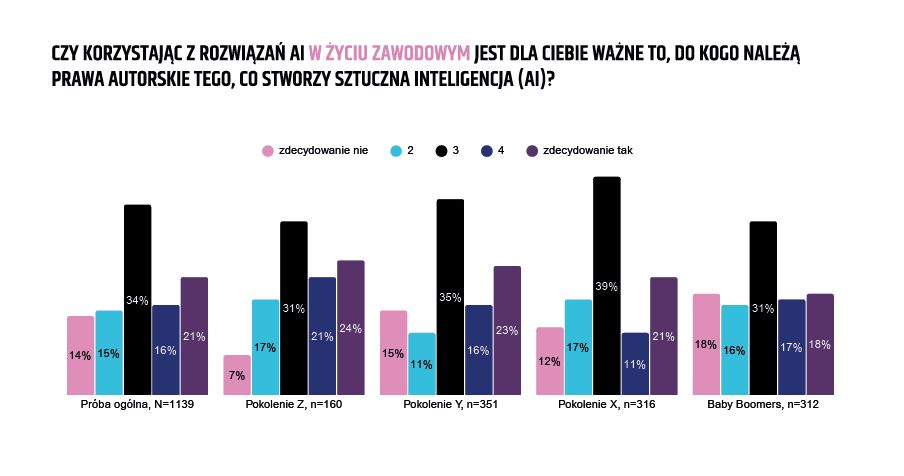
Artificial intelligence is boldly entering more and more areas of our lives. Are we keeping up with its development and do we understand how it works? Where do we see threats from AI, where do we place our hopes? The answers to these important questions are provided in the report "Between Curiosity and Uncertainty. Generations of Poles and Artificial Intelligence – Knowledge, Experience, Moods", prepared on behalf of Wrocław University of Science and Technology by the research agency K+ Research.
The study included representatives from four generations: Z, Y, X, and baby boomers. As a result it was possible to capture the dynamic generational differences in the level of knowledge, moods, and expectations of Poles towards AI.
– The collected research material allows a varied picture of Polish society, which still knows little about AI-based solutions and does not fully understand how it works. However, there is hope in the fact that despite the sense of uncertainty, each generation recognises the potential in the development of artificial intelligence and expresses a willingness to deepen their knowledge on the subject – says Prof. Kamil Staniec, the vice-rector for education at Wrocław University of Science and Technology.
Artificial intelligence – we know it exists, but explaining how it works is another matter
Almost all participants in the study have come across the concept of artificial intelligence – 87% of them claim this. Many still don't know, however, what lies beneath this concept. Only 15% of surveyed Poles rate their knowledge of artificial intelligence-based solutions as high. A bit more – 23% – declare that they understand how specific AI tools work. Every fifth survey participant could not identify any known AI-based solution.

AI at work? We are "on board", but we don’t know how to use it
Almost half of the respondents see the usefulness of AI in professional life. Application of artificial intelligence at work is slightly more often appreciated by baby boomers (56% T2B responses), respondents with higher education (64% T2B), and people living in Polish urban areas (61% T2B).
Unfortunately, despite the declared openness to using AI at work, more than half of the respondents admit that they do not use AI-based solutions in their professional field. If we do turn to AI, it is mainly in search of creative inspiration, for instance, by using language models like ChatGPT.
– The clear discrepancy between the need to use AI and its actual implementation in the workplace stems not from a lack of trust, but from insufficient knowledge and a lack of implementation skills – particularly in organisations that do not have a technological culture – notes Prof. Tomasz Kajdanowicz, head of the Department of Artificial Intelligence at Wrocław University of Science and Technology.
| Grupa | W ogóle nie są potrzebne | 2 | 3 | 4 | Są bardzo potrzebne |
|---|---|---|---|---|---|
| Próba ogólna (N=1139) | 7% | 8% | 36% | 31% | 18% |
| Pokolenie Z (n=160) | 6% | 11% | 34% | 31% | 18% |
| Pokolenie Y (n=351) | 12% | 7% | 35% | 28% | 18% |
| Pokolenie X (n=316) | 6% | 8% | 43% | 28% | 15% |
| Baby Boomers (n=312) | 5% | 7% | 32% | 36% | 20% |
Technology that saves lives
Polish people link their greatest hopes regarding AI with the advancement of medicine. Respondents, regardless of age, believe that artificial intelligence will become an aid in faster and more effective diagnostics, the development of new therapies and drugs, as well as in performing procedures and surgeries. It is in healthcare that respondents see the greatest potential for AI. This is particularly noticeable in the responses of the baby boomer generation.
Programming, scientific development, and cybersecurity are other areas alongside medicine that survey participants most frequently identify as having potential for artificial intelligence (respectively 39%, 30%, and 28% in quantitative studies).
We fear manipulation and losing our jobs
Despite recognising the potential in artificial intelligence development, we are not free from concerns about AI in certain areas of life. Among the most frequently mentioned threats were disinformation and information manipulation – beaing feared by 44% of respondents. The so-called technological unemployment ranked second (39%), followed closely by the feeling of loss of security and privacy (35%). These fears focus on ethical issues: deepfake, model hallucinations, lack of transparency, environmental impact, and difficulties in determining responsibility.

Experts from Wrocław University of Science and Technology acknowledge that AI is transforming the job market, noting that what respondents perceive as "exclusion" is often actually a change in job requirements or the need for retraining.
– There is a belief that AI will not replace people in the workplace, but employees using AI will have an advantage. It is therefore crucial to understand which tasks in a given position can be supported or replaced by AI tools, and which will still require human presence – says Katarzyna Oleszek-Sławińska from the Career Office at Wrocław University of Science and Technology.
| Grupa | Zdecydowanie nie | 2 | 3 | 4 | Zdecydowanie tak |
|---|---|---|---|---|---|
| Próba ogólna (N=1139) | 14% | 15% | 16% | 21% | 34% |
| Pokolenie Z (n=160) | 7% | 17% | 21% | 24% | 31% |
| Pokolenie Y (n=351) | 11% | 15% | 16% | 23% | 35% |
| Pokolenie X (n=316) | 12% | 11% | 11% | 27% | 39% |
| Baby Boomers (n=312) | 18% | 16% | 17% | 18% | 31% |
Full version of the report "Between Curiosity and Uncertainty. Generations of Poles and Artificial Intelligence – Knowledge, Experience, Moods"
Poles overlook ethics and copyright in AI discussions
– Most respondents do not place much importance on who owns the copyright to AI-generated content, nor on the security of the provided data. This is not solely due to ignorance – although that undoubtedly plays a role – but also due to the habits we have developed over years of living in the digital space, aptly diagnosing the Polish approach to ethical and legal issues in the area of AI – says Prof. Tomasz Kajdanowicz.
And indeed – as many as 44% of respondents do not know whether there are any regulations regarding the use of AI tools in their workplace. This phenomenon affects both professional and private life.
Research commissioned by Wrocław University of Science and Technology clearly shows that despite uncertainties about the future due to the development of AI, we are still curious about it and as a society, we remain open to exploring it. 43% of respondents express a desire to expand their knowledge about AI. The greatest motivation is observed among the youngest generation, which – as experts emphasise – holds a significant potential that is worth supporting through modern education.
– I believe that the conclusions contained in the report will reach a wide audience and will become helpful in better understanding the world we live in. On the other hand, for educational and administrative units, as well as business representatives, it will serve as an impetus for collaboration and initiatives that will enable them to better meet the needs of the modern economy and labour market – emphasises Prof. Kamil Staniec.
Detailed results of the study commissioned by Wrocław University of Science and Technology can be found in the report "Between Curiosity and Uncertainty. Generations of Poles and Artificial Intelligence – Knowledge, Experience, Sentiments".







